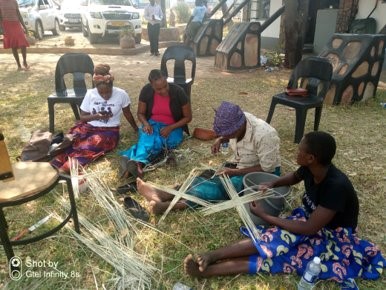The project collaborates with Binga Craft Centre, Batonga Community Museum, Lusaka Museum, Choma Crafts Centre, teachers and intergenerational participants from the community. Binga Craft Centre and Choma Crafts Centre are organizations that coordinate Tonga craftsmen and women between Zambia and Zimbabwe by collecting their wares and selling them(Ncube, 2019). The Batonga Community Museum was established in 2000 but declared a national museum in September 2002(Mawere, 2015). These organizations identify the skilled crafts persons and the youths. A local stakeholder consultation meeting was used to identify the organizations and create synergies. For this exercise, two participants from each organization were selected. Following that consultation, the two organizations identified the five-day workshop participants. Four participants were chosen for each craftwork. The five-day workshop involving the youth and the elderly who are specialists in various crafts such as basketry and weaving was held.

This intergenerational engagement takes place between crafts persons and the unemployed and disempowered youth with the view of empowering them. The elderly are season experts in the production of various crafts that range from baskets and carvings while the youth are unemployed and marginalized. The aim of intergenerational interview was to promote dialogue between youth and elderly populations. First the youths were trained on how to conduct interviews especially how to talk to the elders in a more respectful manner as expected in Tonga culture. They were also introduced to how to use digital media to empower their communities through capturing parts of both tangible and intangible culture as well as recording invaluable conversations (Gift et al., 2018). After this training, the youths were given an opportunity to each interview and record their conversations with the elderly. Consent was sought from the elderly before they are recorded and to ease the tense situation that might emerge from the idea of recording and the process took place while the elderly were teaching the youth about their craftsmanship. Capturing memories in this way enabled cultural and intellectual transformation (Gift et al., 2018) of the Tonga to take place in a more freer environment and way.

